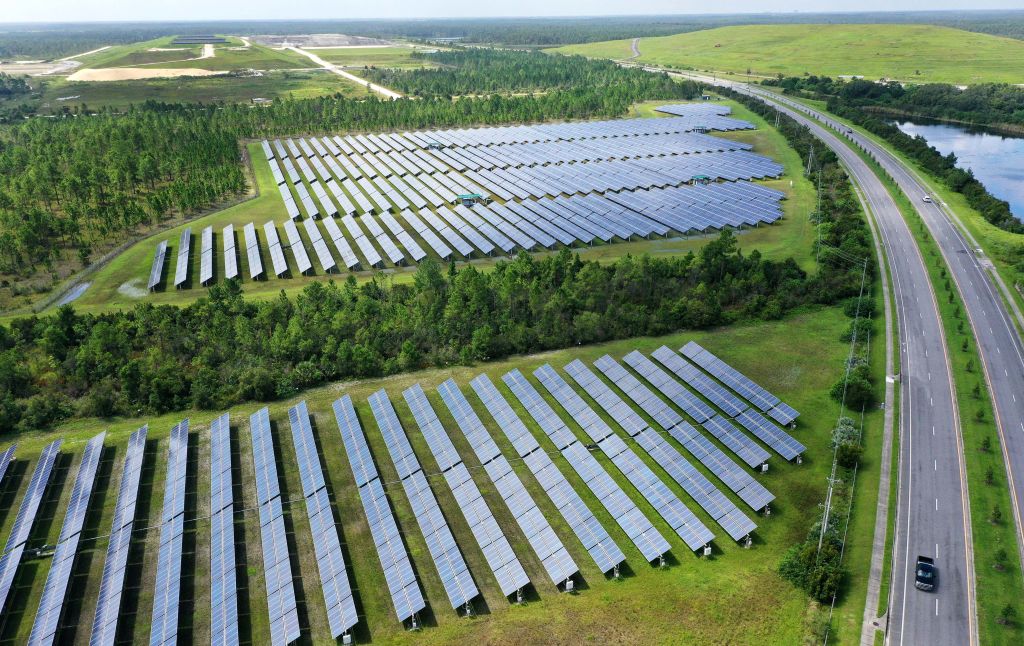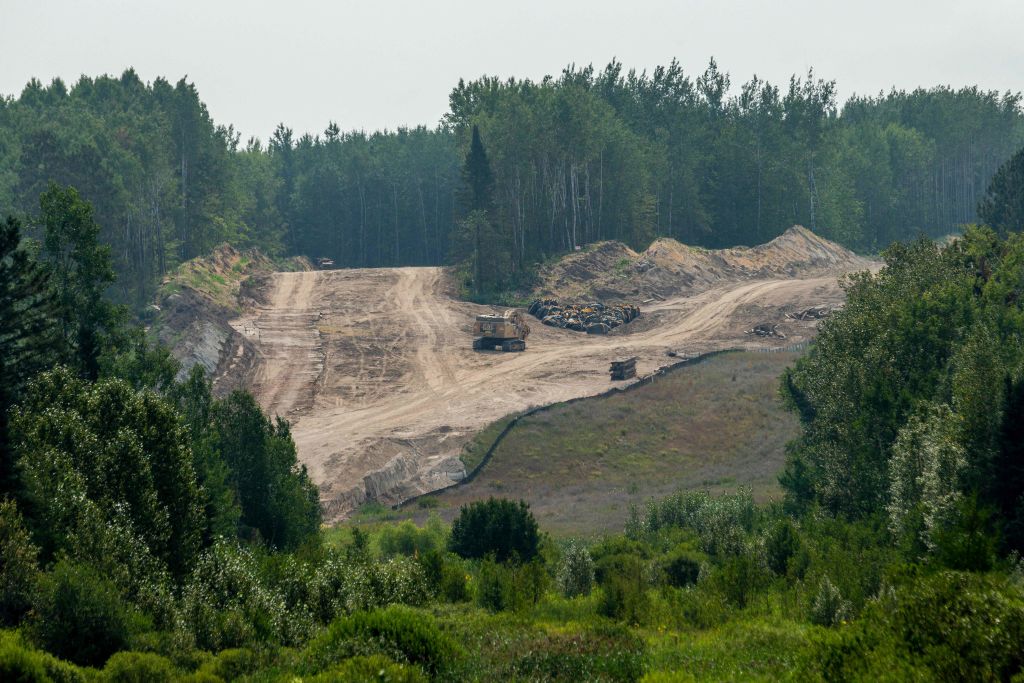Grid And Bear It
October 8, 2021

The Daily Pnut covers a wide range of topics and news, and we got to thinking: “do our readers still watch Saturday Night Live?” So, we thought we’d ask you, the Daily Pnut readers, to help us conduct a survey! We’ll share the results next week.

“To argue with a man who has renounced the use and authority of reason, and whose philosophy consists in holding humanity in contempt, is like administering medicine to the dead, or endeavoring to convert an atheist by scripture.” — Thomas Paine

Grid And Bear It

Electricity is delivered to consumers through a complex network called the grid. It consists of over 7,300 power plants and transformers connected by more than 450,000 miles of high-voltage transmission lines serving 145 million customers. Each region has interconnected local electricity grids, which maintain reliability by providing multiple routes for energy to flow to supply power to multiple load centers. This ensures minimal loss of service in case transmission lines or power plants fail. The Eastern Interconnection operates in states east of the Rocky Mountains, while the Western Interconnection covers the Pacific Ocean to the Rocky Mountain states.
The Federal Energy Regulatory Commission (FERC) imposes mandatory reliability standards on all generation and transmission owners throughout the continental U.S., with one exception. Since the 1930s, Texas has operated its own intrastate power grid to avoid any federal regulation. That fact hadn’t drawn much national attention outside the industry until the massive failure of the Texas grid during February’s deadly freeze.
Electric grids must exist in constant balance, and utilities have sophisticated systems for predicting when demand will go up and down. Grid operators constantly monitor and manage the demand, supply, reserve margins, and power mix to ensure that power plants produce the right amount of electricity to meet demand at any given time. The production of electricity is adjusted in 15-minute intervals to account for demand changes throughout the day to avoid a blackout or other cascading problems. In an unplanned emergency, grid operators can buy extra power from neighboring utilities, something Texas chose not to do last winter. Or, they can strike that balance by burning more fossil fuels.
Burning fossil fuels is hastening the planet’s warming and causing the climate to change, which is exacerbating extreme weather conditions and wreaking havoc on the electric grid. The best solution to slowing down climate change would be a massive deployment of renewable power like wind and solar. Gas and coal power plants generate continuous power by burning fuel, and how much they burn can be modulated based on the demand for electricity. But the generation of solar and wind energy fluctuates, which can create a mismatch between demand and supply. Currently, utilities’ ability to load giant batteries up with solar power in the morning and store it for when customers need more energy is still quite limited.
As renewable sources take over the energy mix, utilities won’t be able to quickly spin up more supply by burning fossil fuels. A future grid that runs on an often intermittent supply of energy from renewables will need to be far more flexible to compensate. This will demand a fundamental rethinking of how the power grid operates. (Anthropocene Institute, FERC, Texas Tribune, Wired)

Pipe-line Of Communication

- For 67 years, Calgary-based Enbridge Energy has moved oil and natural gas from western Canada, through Michigan and the Great Lakes, to refineries in Ontario. But Michigan’s Governor Gretchen Whitmer (D) says one section of the company’s pipeline, Line 5 — which crosses beneath the environmentally-sensitive Straits of Mackinac — is a “ticking time bomb,” and she’s shut it down.
- After court-ordered mediation between Enbridge and the governor broke down, the Canadian government invoked a 1977 treaty this week, which says in Article II that no public authority in either country shall interfere with the transmission of hydrocarbons through transit pipelines.
- That would seem to give Canada an edge, except that Whitmer might be arguing Article V, which says “in the event of an actual or threatened natural disaster…the flow of hydrocarbons …may be temporarily reduced or stopped [by or with the approval of] regulatory authorities of the Party in whose territory such disaster, emergency or other demonstrable need occurs.” Now that the treaty’s been invoked, the dispute will be decided by binding arbitration. (Guardian)
Malaria Vaccine Approved
- About 500,000 people die from mosquito-borne malaria each year — nearly all of them in sub-Saharan Africa — including 260,000 children under age 5. The vaccine, developed by the British pharmaceutical company GlaxoSmithKline, showed six years ago that it could prevent 40% of malaria cases and 30% of severe cases. More clinical trials showed an efficacy rate of just 30% in the first year, and to be fully effective four doses were required starting at age 5 months, a huge challenge for the continent.
- On Wednesday, the World Health Organization approved the vaccine, although many remain concerned about the relatively low protection it offers. A WHO spokesman said it would obviously be better if the efficacy rate were higher, but with hundreds of millions of cases, a 30%-40% reduction is still a huge number of lives saved. Health authorities also stress that the vaccine is yet another new weapon in the fight against malaria, to be used alongside other preventative measures like treated bed nets and drugs that target the malaria parasite. (NYT)
Additional World News
- Pakistan earthquake kills 20 in Balochistan province (BBC)
- In Venice, High-Tech Tracking of Tourists Stirs Alarm (NYT, $)
- 100-year-old goes on trial accused of 3,518 Nazi war crimes (CNN)
- Justin Trudeau sorry for skipping first national truth and reconciliation day (BBC)
- WHO starts shipping COVID-19 medical supplies to N. Korea (AP)
- Lakhimpur violence: Families want justice, says Priyanka Gandhi (BBC)
- A Sea of White Faces in Australia’s ‘Party of Multiculturalism’ (NYT, $)

Block Step
- U.S. District Judge Robert Pitman issued a legally sound 113-page order Wednesday granting the Justice Department’s request for a preliminary injunction blocking Texas’ six-week abortion ban, formally known as the Texas Heartbeat Act. “From the moment S.B. 8 went into effect, women have been unlawfully prevented from exercising control over their lives in ways that are protected by the Constitution,” Pitman wrote. “That other courts may find a way to avoid this conclusion is theirs to decide; this Court will not sanction one more day of this offensive deprivation of such an important right.”
- S.B. 8 is a novel enforcement scheme Texas concocted, designed to circumvent judicial review of the onerous law, and thereby eliminate the legal pathway abortion rights advocates have taken to obtain court orders blocking such extreme laws. The state immediately filed a notice of appeal with the ultra-conservative 5th Circuit Court of Appeals, which along with the U.S. Supreme Court had previously rejected a request from clinics to block the law from taking effect. (CNN)
From Your Lips To Bears Ears
- President Biden is restoring two sprawling national monuments in Utah that former President Trump had significantly downsized. Bears Ears and the Grand Staircase-Escalante cover vast expanses of southern Utah and contain historical artifacts. The Trump administration cut Bears Ears, on lands considered sacred to Indigenous peoples, by 85%, and slashed Grand Staircase-Escalante by almost half.
- The reductions were among the most controversial of Trump’s environmental decisions, and paved the way for potential coal mining and oil and gas drilling on lands that were previously off-limits. Environmental advocates and indigenous leaders have fought for years to restore protections for the monuments. (Guardian)
Additional USA News
- Voters in 36 states will elect a governor next year. Here’s a cheat sheet. (Politico)
- New details of Brian Laundrie’s movements emerge as officials find recent campsite in Florida reserve (CNN)
- Pfizer Asks F.D.A. to Authorize Its Covid-19 Vaccine for Children 5 to 11 (NYT, $)
- Man accused of killing 3 wanted to confront pharmacist brother over Covid vaccines, documents say (NBC)
- Ship’s anchor may have caused massive oil spill off the coast of Southern California (NPR)
- Body found in Orlando confirmed to be Miya Marcano (CBS)
- Top Trump aides set to defy subpoenas in Capitol attack investigation (Guardian)

An Ambering Man
- Tardigrades are microscopic organisms better known as “water bears” or “moss piglets” because of their shape and the fact that they commonly live in the water. These eight-legged micro-animals have been around forever, most likely due to their ability to survive in conditions that would be fatal for other animals. They’re so indestructible, in fact, that NASA has launched them into space, along with bobtail squids. Researchers are attempting to learn more about how the conditions of spaceflight can affect biological organisms and, by extension, future astronauts.
- Yet despite their long evolutionary history and ability to survive extreme conditions, tardigrades are also almost completely missing from the fossil record. That’s why scientists were so elated about the discovery of a microscopic tardigrade suspended in 16 million-year-old amber. The amber with the fossilized tardigrade was mined from La Cumbre, a region of the Dominican Republic. It’s only the third clear tardigrade fossil ever found, and the first one found from the Cenozoic era, the era beginning 66 million years ago.
- The researchers at New Jersey Institute of Technology and Harvard University who discovered the fossil published their findings in Proceedings of the Royal Society B on Wednesday. The senior author of the study called the discovery a “once-in-a-generation” event. “What is so remarkable is that tardigrades are a ubiquitous ancient lineage that has seen it all on Earth, from the fall of the dinosaurs to the rise of terrestrial colonization of plants … they are like a ghost lineage for paleontologists with almost no fossil record.” (NPR, Royal Society Publishing)
Additional Reads
- The ‘Poohsticks Bridge,’ made famous in Winnie the Pooh, has gone up for auction (NPR)
- Snap is taking action to address fentanyl dealing on Snapchat (The Verge)
- Twitch Streamers’ Earnings Were Exposed. Now, It’s a Meme (Wired)
- Exclusive: Ozy Media’s deepening crisis (Axios)
- China’s Moon mission returned youngest ever lavas (BBC)
- New images from Mars will guide search for evidence of ancient life, says study (Guardian)
- Barbara Corcoran Apologizes to Whoopi Goldberg for Body Shaming Remark Made on The View (People)